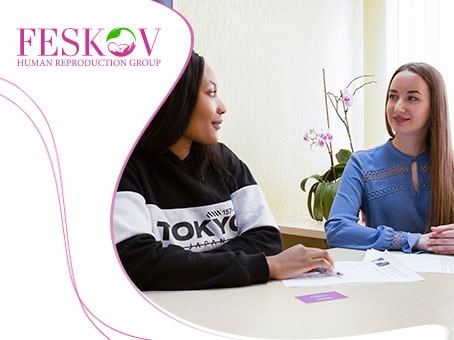
Egg Donation: What Is It and How Does It Work?

When a couple is faced with the problem of conceiving an heir in a natural way, ART methods come to their aid. Often, IVF or “in vitro conception” under medical supervision resolves these issues. But what if there is no way to get normal oocytes from the expectant mother? In this case, donation is usually involved - when another woman donates her eggs to a couple to conceive a baby.
Feskov Human Reproduction Group implements guaranteed programs IVF with donation providing a different range of services, according to the needs of patients.
When is egg donation used?
It is clear that any family wants to have a 100% own baby. But, if the expectant mother has such fertility problems that prevent the removal of good oocytes for use in the IVF procedure, you have to agree to a donation.
This happens in the following cases:
- ovarian pathology in a woman;
- the presence of genetic diseases that can cause congenital anomalies in the fetus;
- elderly age.
In serious clinics, as in our Reproduction Center, donors are selected that are most suitable for the phenotypic characteristics of the couple. Plus, people's personal wishes are always taken into account.
Donor requirements
In the databases of oocyte donors of the Feskov Human Reproduction Group, there is general information about women, their phenotypes, race, individual traits, as well as photographs.
The following applicants are involved in programs with donation:
- age 21-36;
- have at least one healthy child born naturally;
- with good indicators of the state of health of physics and psyche.
This age range is due to the fact that, during this period, women respond best to treatment with hormonal drugs. And also, they have a large number of high-quality eggs. Additional requirements in the form of good looks, higher education and other points remain at the discretion of the couple.
To minimize the risk of congenital fetal abnormalities and ensure healthy genetics for the future child, donors must pass:
- physical examination by a doctor;
- blood tests;
- ultrasound diagnostics and other studies of reproductive organs;
- screening for infectious diseases;
- screening for common hereditary diseases or for all known genetic pathologies (more than 300), depending on the chosen program;
- every month tests for drugs, smoking, precursors;
- mental health assessment.
Depending on the country, donation can be either anonymous or open. In Ukraine, both types of donation are legal for financial reward from the clinic. But, in any case, the donor has no legal rights and obligations in relation to born children or embryos, which is confirmed by the relevant documents.
A unique VIP program IVF + donation is provided by our Reproduction Center, which continues until the guaranteed birth of a healthy child. According to the package, you can personally meet and communicate with the selected donor candidate to make an informed decision.
Donation process
Reproductive programs with donation have the following stages:
- Comprehensive medical diagnostics of husband and wife.
- Careful selection of a candidate who is ready to donate her sex cells.
- Hormone therapy for both the selected donor and the expectant mother to synchronize their natural cycles. And also, for donor stimulation of ovulation, so that under the influence of hormonal agents not 1-2, but 8-10 oocytes mature.
- Transvaginal puncture of the donor's ovaries to remove the best eggs. The procedure is not painful and takes place under local anesthesia. No rehabilitation is required.
- Conception "in vitro", under the supervision of doctors in the laboratory, as a result of which, after 4-6 days, embryos are cultured.
- After genetic screening, the most viable and healthy embryo is transferred to the recipient's uterus.
- The occurrence of pregnancy.
The risks associated with this procedure are quite low. The most serious complication in the process is ovarian hyperstimulation syndrome, which occurs during a hormonal stimulation protocol. But, with the current high quality of hormonal drugs in particular and medicine in general, it is very rare.
Donation success factors
Even with a correctly chosen donor, an ideally performed IVF procedure, no one can predict with what attempt the embryo transfer will end with a long-awaited pregnancy. Some programs use fresh oocytes, others frozen. Sometimes even cryopreserved embryos are used. If frozen oocytes are used, donor ovulation is not stimulated.
Doctors recommend 4 to 6 IVF attempts, without harming your health. Since the more IVF cycles are required, the less chance of success. Then you should think about an alternative option - surrogacy.
For several decades, Feskov Human Reproduction Group specialists have been helping childless families from all over the world find parental happiness. A variety of reproductive programs with a 100% guarantee will give you a dear baby!
- Surrogate motherhood - how not to be deceived
- Advantages of guaranteed surrogacy programs over programs with guaranteed compensation
- Surrogacy in Mexico: What You Need to Know
- Disadvantages of Egg Donation - Only Truth about the Procedure
- Unique Cases of Giving Birth to Children
- Egg Donation Costs
- Egg donation near me
- Donor egg + IVF: cost, guarantees, pitfalls
- Egg donation in Norway
- Egg donation in Scotland
- Egg Donation Costs in the UK
- Private egg donation
- Age limit for surrogacy: international standards
- Egg donation in Finland
- Frozen egg donor
- Egg Donation Timeline: From Application to Post-Procedure
- Embryo evaluation: understanding embryo quality assessment
- Egg donor in Europe
- Egg donation in the Czech Republic
- Cost of egg donation in Spain
Join my mailing list to receive the latest news and updates
